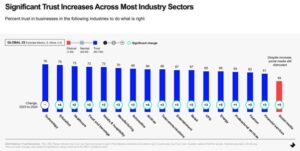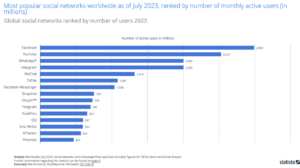Why Building Trust Matters
Thursday, 20th June 2024Authored by University of Salford Business School’s Mirage Islam, Senior Lecturer in Digital Marketing
Owning and growing your business, whether a start-up or SME presents many challenges, but business leaders need to be resolute on one thing: Building trust with clients and customers is paramount.
Knowing what your organisation stands for can help you build trust with your customers.
When it comes to digital marketing and branding, one of the biggest challenges for organisations regardless of sector or industry is not just about posting content on social media platforms but having the ability to engage customers in an authentic manner to build trust. There is of course the need to engage those same customers on their preferred platform and in a format that works for that audience.
Building trust is hard to do and even easier to lose. Every year global communications firm Edelman produces a report based on research from 32,000 respondents from 28 countries and the best part is that they give it away for free. They call it the Trust Barometer and in this one act of altruism they have, in part, over the past twenty-four years, built their brand and reputation based on this source of valuable insight. As a result, many organisations and their brands, marketeers at all levels use this information to think strategically about what matters to their customer base and with that information deliver more effective digital marketing campaigns. In short, business professionals trust this data and in turn the organisation that supplies it.
At a time when there is a distinct lack of trust in all aspects of society, research indicates that consumers are looking to CEOs of the brands they work for and do business with to take a stance on issues. This growing expectation is resulting in greater trust across all industries. (See Image 1)

Source: 2024 Edelman Trust Barometer
Consumers want CEOs to come up with solutions on issues of social justice that are important to them such as sustainability, climate change and anti-racism. We have seen more and more brands taking a stance in this space, to engage with customers, to build relationships and trust focusing on issues that is in the public discourse.
Digital Innovation and the unprecedented rise of AI is not only disrupting marketing but also re-writing the way we do things. Post-Pandemic clients and consumers, are living out their daily lives through digital interfaces, using social media to communicate, shop, keep up to date and learn and the list goes on. The organisations that invested in digital infrastructure and skills pre-lockdown reaped the rewards, whilst those who were yet to invest or begin their digital transformation, are now making it a priority to stay relevant and more importantly remain profitable.
What must business leaders do?
Innovation is driving changes in consumer behaviour, especially in a digital context consist of increased activity online in terms of shopping, seeking out new information, staying in touch with friends, as well as consuming huge amounts of content across multiple social media platforms. According to Global Web Index, Smartphones became the most dominant device for all age groups globally in 2019. According to Oberlo, as of August 2023, 91.85% of all searches are on Google with a staggering daily page views on images of 1 billion according to industry guru Neil Patel. Another vital statistic is how much video content we are now watching, research carried out by Wyzol in 2023 found that people are watching on average 17 of online videos per week. Platforms such as TikTok, YouTube, Instagram and Facebook playing their part.
This requires business leaders to ensure organisations have an effective digital strategy, one that is based on sound research and insights. Simply put, without a sound foundation of data,
an organisation will struggle to maintain meaningful connection and relationships with customers.
These changes in consumer behaviour with more and more time being spent online means that organisations across all sectors and verticals need to hire specialist digital talent with skills in digital marketing, UX, UI, content developers, SEO and Paid Media.
To remain competitive, organisations need to seek out and attract the right talent to remain competitive. This is a challenge as all companies are competing for the same talent. The power lies with those with the skills. However, through authentic and transparent communications from the content on website to post social media activity, when done right an organisation can resonate and build trust with skilled talent and consumers simultaneously.
In digital marketing terms, the more an organisation knows about its target audience, the more focused the messaging can be.
This starts with a clear vison. As a business leader it is important to have clarity on certain matters when mapping out a strategic digital communications plan and building that digital strategy. This requires understanding:
· Who you are? What you stand for and what impact you want to have?
· Establishing the overall objective – what do you want to achieve?
· Who are your customers – what drives and matters to them?
· Where do they spend their time online?
Having a clear understanding of who you are, what you stand for and the impact you want to have will allow you to craft, clear and coherent communications. Authentic communications across relevant digital and social media platforms, especially your owned media can resonate with your target audience. Being authentic means that as digital marketeers, it is possible to communicate and connect with customers based where they are, online, and in a way that resonates and is also meaningful on the right social media platform. (See Image 2).
Image 2: Most popular social media networks worldwide:

Source: Statista (2023)
To conclude, whether a start-up, SME or multi-national corporation, it is imperative to understand the who and the why? Because this is what your target audience want from you, regardless of whether they are Generation Z, Millennials, Gen X, Baby Boomers, or Silver Surfers. Talking in a language that consumers understand, knowing what drives them by being authentic. Never pretend to be something you’re not, on platforms that the target audience spend their time on, can reap many returns for your organisation and ultimately build trust.
—
About Mirage Islam
A Senior Lecturer in Digital Marketing at University of Salford Business School and a Digital Strategy Consultant, Mirage helps business leaders and their organisations gain competitive advantage. Mirage has worked with leading global brands to ensure their marketing and people deliver – this, in turn informs his teaching practice, enabling and empowering future talent to be industry ready.
Mirage started his marketing career in Financial Services and then FMCG, before joining one of the UK’s largest mobile Internet portals in 2000 – developing online communities and in-game sponsorship opportunities for iconic brands. He then spent 7 years with Sky, launching and leading its first Digital Partnership Programme, before becoming Future Media Lead with Executive sponsorship.
He has since worked with Commercial, Marketing and HR leaders in the UK and overseas including organisations such as Channel 4, TalkTalk, EY, Coca-Cola, Jardine Matheson,
Saatchi & Saatchi and Publicis Worldwide, to ensure their marketing teams understand the latest trends and innovations in Digital Marketing and shifts in consumer behaviour.
Formerly Chair of the Learning and Innovation at the British Interactive Media Association (BIMA), in 2007 he launched a UK Digital Knowledge Programme in partnership with Microsoft and Sky, to address industry skills gap, that is still developing digital skills in young people.
Mirage is committed to developing future talent and can translate the changes in Digital communications, consumer behaviour and impact on organisations to ensure organisational effectiveness. He is a Fellow of the Royal Society of Arts after being invited to join for his contribution to the Marketing and Communications industry and a judge on several digital awards bodies.
In his spare time Mirage mentors’ young people and works with charities to help develop their digital capabilities.
LinkedIn: https://www.linkedin.com/in/mirageislam/
UoS Website – https://sustainable-innovation.salford.ac.uk/
UoS Email – [email protected]